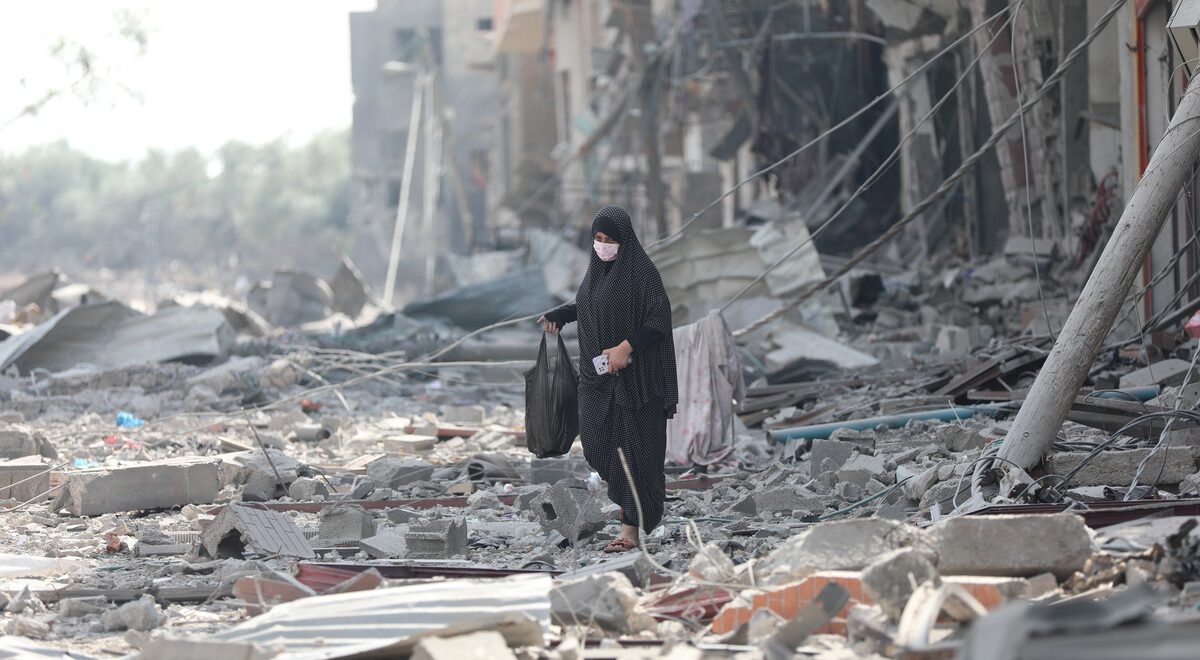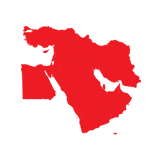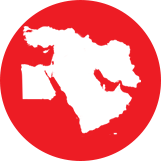Aid trucks carrying lifesaving medical supplies and water are slowly trickling into Gaza. Still, it’s clear this small amount will barely scrape the surface of the humanitarian crisis unfolding in Gaza.
Women are having to give birth without anesthesia, undergoing caesareans while awake, and without painkillers, all amongst intense bombardment. Our aid workers in the occupied Palestinian territory are reporting a rise in the number of cases of patients with high fevers, many of them children. We are very concerned that a lack of clean water and hygiene is contributing to a rise in sicknesses, alongside the severe deterioration of living conditions across Gaza.
Many women, like Khitam, a mother of a newborn baby sheltering in southern Gaza, are having to make perilous journeys as evacuation orders for those in northern Gaza remain in place, and hospitals continue to face intense bombardment.
“At first, when [the] bombing and missiles started, [and] the [order] to evacuate houses was issued… [At the time that] we left our houses, had given birth just two days earlier. I was postpartum and tired. I had just been discharged from the hospital and [was still] bleeding. I was carrying [my daughter] and running. We were walking under missiles and shelling, sitting for a while to rest on the pavement and in the streets. We rested and then continued on our way until we reached this school.”
There are over 21,000 people injured in Gaza and receiving urgent care. Yet, trucks that have crossed into Gaza in recent weeks have only delivered enough medical supplies to cover 5,000 injured people. The occupancy rate in Gaza’s hospitals has reached more than 150%, according to Gaza’s health ministry. Hospitals have become a place of shelter for many Gazans, with the latest figures showing around 117,000 IDPs in northern Gaza alone.
Soraida Hussein-Sabbah, Gender and Advocacy Specialist for ActionAid, said:
“The chaos and horror unleashed in Gaza is affecting women in devastating ways. Conditions in hospitals are dangerous. C-sections and major surgery are being performed with only the torch on a phone providing light as they undertake complex medical procedures as the bombs fall around them. Every day, we hear of doctors delivering the babies of women who are dying in childbirth. It is catastrophic.”
With women accessing less than half the UNDP recommended daily intake of water, and with food running out, pregnant and breastfeeding women are struggling to produce the milk they need to feed their babies and keep them alive, with some mothers telling ActionAid that their babies’ skin was turning yellow due to a lack of breastmilk. According to the UNFPA, an average of 160 pregnant women like Salma are expected to give birth every day over the next month. With two-thirds of health clinics across Gaza not functioning, there will be little or no availability of services like emergency obstetric care, according to the WHO. Sheltering in a school in southern Gaza, Salma spoke about how mothers like her prioritize water for their children in the midst of severe food and water shortages.
Salma said:
“There is not enough water for drinking, washing, or anything. There is not enough food, no health services, no water, and no electricity. The simplest requirements of life are not available here. As a pregnant woman, I fear for [my unborn child], as I am in my [final] month [of pregnancy]. There is not enough food or water for me and the baby. I do not [have water to] drink. Sometimes, I deprive myself of water in order to give it to my children.”
According to the Palestinian Ministry of Health, of the 8,525 Palestinians that have been killed since October 7th, 3,542 of these were children, and 2,187 were women.
Soraida Hussein-Sabbah said:
“The death of thousands across Gaza is a complete tragedy, and for women who have survived, many are dealing with the immense trauma of losing loved ones, many of whom are children. These are women who are showing incredible resilience in keeping families and communities on their feet – but they cannot do it alone and under such immense trauma and while nowhere is safe to shelter.”
Her words are echoed by an ActionAid Palestine staff member in Gaza:
“We feel helpless looking in our children’s eyes; we are unable to ease their worries. We cannot say ‘It will be alright,’ or ‘you’re safe.’ Truthfully, there is no safe place in Gaza. Nowhere is safe here, north or south… We only want this war to stop immediately. We request for the bloodshed, the killing of women and children to stop. My biggest wish now is to go back home. To sleep on my own bed, and use my own bathroom, that’s all.”
ENDS
For media requests, please email Christal.James@actionaid.org or call 704 665 9743.
The following spokespeople are available:
- Riham Jafari, Coordinator of Advocacy and Communication for ActionAid Palestine
- Soraida Hussein-Sabbah, Gender and Advocacy Specialist for ActionAid Spain, based in Ramallah, oPt.
About ActionAid
ActionAid is a global federation working with more than 15 million people living in more than 40 of the world’s poorest countries. We want to see a just, fair, and sustainable world in which everybody enjoys the right to a life of dignity and freedom from poverty and oppression. We work to achieve social justice and gender equality and to eradicate poverty.


